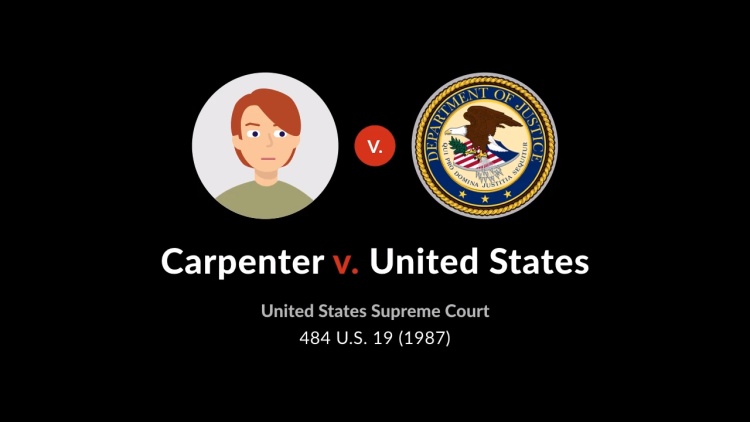Carpenter v. United States
United States Supreme Court
484 U.S. 19 (1987)
- Written by Jamie Milne, JD
Facts
R. Foster Winans, Kenneth Felis, and David Carpenter (defendants) were involved in a scheme that used confidential information to take advantage of the stock market. Winans was one of the writers on a daily column for the Wall Street Journal (the Journal) that discussed selected stocks and provided readers of the Journal with investment insight. Information published in the column often impacted the value of the stocks discussed. The Journal’s policy was that, prior to publication, the content of the column was considered confidential business information. Despite awareness of this policy, Winans entered into an agreement with Felis and Peter Brant, who were both stock brokers at Kidder Peabody. Under the agreement, Winans would reveal the contents and release dates of several columns so that Felis and Brant could trade advantageously before publication. Over a four-month period, the prepublication trades amassed net profits of approximately $690,000. The scheme was discovered when both Kidder Peabody and the Journal became suspicious of the correlation between the columns and the trades. Winans and Carpenter, Winans’s roommate, eventually went to the Securities and Exchange Commission to reveal the scheme. Winans and Felis were convicted of violating the mail and wire-fraud statutes, 18 U.S.C. §§ 1341, 1334, and other securities statutes. Carpenter was convicted of aiding and abetting. Winans and Felis appealed on the grounds that: (1) the conduct was not a scheme to defraud within the scope of the mail and wire-fraud statutes, and (2) there was no evidence that money or property was taken from the Journal, which was a required element for conviction under the statutes.
Rule of Law
Issue
Holding and Reasoning (White, J.)
What to do next…
Here's why 907,000 law students have relied on our case briefs:
- Written by law professors and practitioners, not other law students. 47,100 briefs, keyed to 996 casebooks. Top-notch customer support.
- The right amount of information, includes the facts, issues, rule of law, holding and reasoning, and any concurrences and dissents.
- Access in your classes, works on your mobile and tablet. Massive library of related video lessons and high quality multiple-choice questions.
- Easy to use, uniform format for every case brief. Written in plain English, not in legalese. Our briefs summarize and simplify; they don’t just repeat the court’s language.





